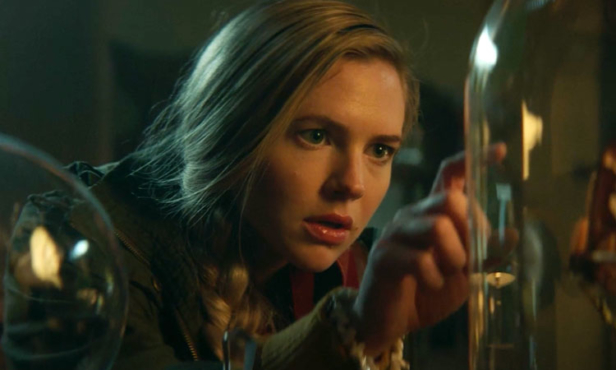‘Raven’s End – Where Your Story Begins’, reads the sign marking the entrance to the mist-shrouded coastal town, as a little boy cycles by with an old analogue camera over his shoulder. This boy is looking for a story alright. With aspirations to become an investigative reporter, he hopes to uncover the rumoured mystery of this place, “plagued by strange phenomena since it was established in the early 1800s – mysterious disappearances, unexplained animal attacks, medical mutations.” The boy also embodies a spirit of pure nostalgia, taking us back to the bike-borne rites of passage of Steven Spielberg’s E.T. the Extra-Terrestrial (1982) or Rob Reiner’s Stand By Me (1986). All the mysteries of Raven’s End lead to a grand 19th Century house in the woods, and its fruitily sinister occupant Montgomery Dark (Clancy Brown) who, for the children of this area, has become a Boo Radley-like figure of fear, mythologised as monstrous evil incarnate, spoken of only in hushed whispers, and approached with extreme caution. For the adults of Raven’s End, however, Montgomery is the town’s respected mortician. Where Potter’s Bluff has its William G Dobbs (in Gary Sherman’s Dead & Buried, 1981), and Morningside has its Tall Man (in Don Coscarelli’s Phantasm, 1979), Raven’s End has Montgomery Dark to take care of the community’s dead – and those left behind.
Writer/director Ryan Spindell’s feature debut The Mortuary Collection is very much concerned with stories. Applying for a job at the mortuary, young Sam (Caitlin Custer) learns from Montgomery that each of the many tomes contained in the old Dark house archives individual stories of how and why townsfolk came to die. At Sam’s prompting, Montgomery regales her with three ‘dark, twisted and awesome’ stories, each from a different decade and each more elaborately macabre than the last: a female thief (Christine Kilmer) at a Fifties soirée does not like what she sees in the mirror. A womanising alpha-male frat boy (Jacob Elordi) tries to take advantage of first year Sandra (Ema Horvath), only to have the sexual tables painfully turned on him. A conflicted man (Barak Hardley) who has been caring for his catatonic wife (Sara Hay) has his marital vows sorely tested. All these tales follow the EC Comics mould: creepy morality tales whose characters find their transgressive acts met with a karmic comeuppance of grisly, supernatural dimensions.
These are punctuated by Sam’s critiques – a sort of choral meta-commentary which serves all at once to ironise the stories’ content while slyly adumbrating Montgomery’s and Sam’s own situation. Ultimately Sam will tell Montgomery her own story, in which – in a resurrection of Spindell’s earlier short film The Babysitter Murders (2015) – childminding Sam must fight off a child-mutilating escapee from the local asylum even as a Halloween-style slasher (called The Babysitter Murders) plays on the TV, misdirecting our expectations of what we are watching, and highlighting how far Sam’s Eighties adventures in babysitting have moved on from the Eighties horror subgenre that our heroine seems to be emulating.
In other words, The Mortuary Collection is a sophisticatedly self-conscious anthology film whose unity of place (if not of time) ensures that its constituent episodes, for all their differences, seem unusually tightly interwoven, with the homely, schlubby Dr Harold Kubler (Mike C Nelson) recurring as a character across the decades. Meanwhile, as Montgomery simultaneously shows Sam the ropes of the mortuary and imparts these tales of punished sins, his own peculiar story proves to be of something more than the mere ‘wraparound’ variety, even as the film hints at several more layers of stories – and storytellers – that might be subjected to future autopsy in a sequel (whether in reality, or in the imagination).
With its every instalment set before the Nineties, The Mortuary Collection is shoruded in a double-edged nostalgia for a past on which the book has never quite been closed. This is achieved in part through the film’s exquisite crafting and stylised sets, transforming 40 years of small-town surrealism into a single, singular vision of faded American gothic, while outlining themes (especially gender prejudice and sexual inequality) that have left a ramifying legacy in today’s world. The film is also, in all its cartoonish gruesomeness, very funny.
The Mortuary Collection was seen and reviewed at Glasgow FrightFest 2020.
